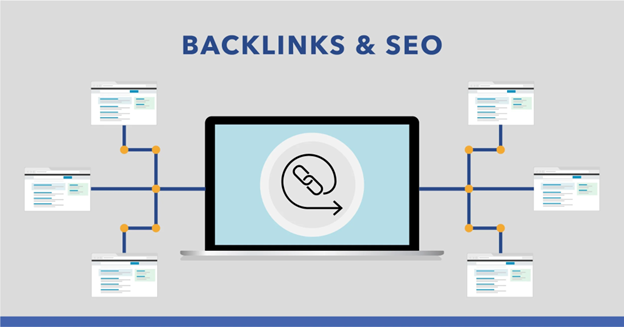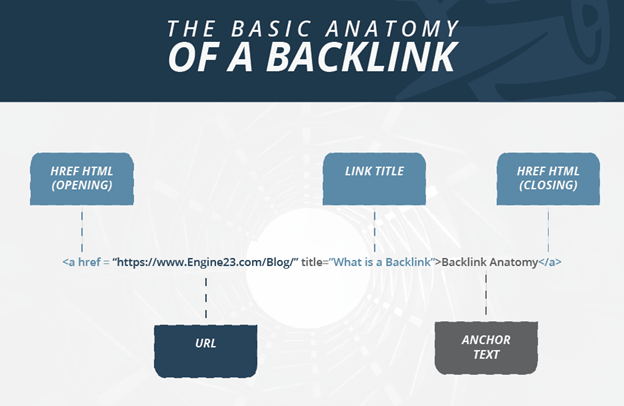SHARE

Building quality backlinks is crucial for improving your website’s search engine optimisation (SEO) and increasing its visibility on the internet. In this comprehensive guide, we will dive deep into the world of backlink building and explore its importance, the anatomy of a quality backlink, strategies for effective backlink building, and how to avoid common backlink building mistakes. By the end of this guide, you will have a solid understanding of backlink building techniques that can help you enhance your website’s online presence and drive organic traffic to your site.
[thrive_leads id=’3729′]
Understanding the Importance of Backlink Building
Before we delve into the intricacies of backlink building, let’s start by defining what backlinks are and why they play a crucial role in SEO.
A backlink, also known as an inbound link, is a hyperlink on another website that links back to your site. In simple terms, it’s when another website finds your content valuable enough to reference and includes a link to it.
Backlinks are like the backbone of the internet. They connect websites together, creating a vast network of information. Just like in real life, where recommendations from trusted friends hold weight, backlinks act as virtual recommendations from other websites. When a website links to your content, it’s essentially vouching for its quality and relevance.
Now, let’s explore the world of backlink building in more detail.
Defining Backlink Building
Backlink building is the process of acquiring links from other websites to your own. It involves reaching out to website owners, creating valuable content that others want to link to, and building relationships within your industry.
Imagine you’re attending a networking event for professionals in your field. You engage in conversations, exchange business cards, and establish connections. Similarly, backlink building is like networking for your website. It’s about forging connections with other websites and convincing them that your content is worth referencing.
Building backlinks is not a one-time task but an ongoing effort. It requires consistent outreach, content creation, and relationship building. The more high-quality backlinks your website has, the more authority and credibility it will have in the eyes of search engines like Google.
The Role of Backlinks in SEO
Backlinks are one of the most crucial factors in determining a website’s ranking in search engine results pages (SERPs). Search engines consider backlinks as a vote of confidence, indicating that your website is trustworthy and provides valuable content.
Imagine you’re planning a trip to a new city and looking for recommendations on the best places to visit. If multiple friends recommend the same restaurant, you’re more likely to trust their judgement and choose that restaurant. Similarly, search engines view backlinks as recommendations from other websites, signalling that your content is worth ranking higher in search results.
However, not all backlinks are created equal. Search engines analyse the quality and relevance of the backlinks pointing to your site. High-quality backlinks from authoritative websites in your niche have a more significant impact on your site’s SEO performance.
Quality vs Quantity in Backlink Building
When it comes to backlink building, quality surpasses quantity every time. It’s not about acquiring as many backlinks as possible but rather focusing on obtaining high-quality backlinks from reputable sources.
Imagine you’re a chef trying to impress a food critic. Would you rather have one positive review from a renowned critic or multiple mediocre reviews from unknown sources? The answer is clear. One high-quality backlink is more valuable than multiple low-quality ones.
High-quality backlinks come from authoritative websites in your niche. They are relevant to your content, provide value to users, and have a strong reputation. These backlinks act as endorsements, signalling to search engines that your website is a reliable source of information.
Building high-quality backlinks requires a strategic approach. It involves conducting thorough research to identify authoritative websites, creating exceptional content that naturally attracts backlinks, and engaging in outreach efforts to build relationships with other website owners.
Remember, backlink building is not a quick fix but a long-term strategy for improving your website’s visibility and credibility. By focusing on quality backlinks, you’ll be on your way to establishing a strong online presence and climbing the search engine rankings.
The Anatomy of a Quality Backlink
A quality backlink is not just any link pointing to your site. Several factors contribute to the relevance and authority of a backlink. Let’s explore these factors in detail:
Relevance and Context in Backlink Building
Relevance is a key factor in determining the value of a backlink. Backlinks from websites that are topically related to your industry or niche hold more weight. When building backlinks, focus on acquiring links from websites that share a similar content theme.
For example, if you have a website that offers fitness tips and advice, it would be beneficial to have backlinks from other fitness-related websites. This not only establishes a connection between your site and the linking site but also indicates to search engines that your content is relevant and valuable within the fitness industry.
Context also plays an essential role in the quality of a backlink. Ideally, the link should be placed within relevant content that adds value to the reader. Avoid unrelated or forced links that seem out of place.
Imagine you are reading an article about healthy eating habits, and within that article, there is a backlink to a website that sells car accessories. This would be confusing and irrelevant to the reader, making the backlink less valuable. However, if the backlink leads to a website that provides further information on maintaining a healthy diet, it would be much more useful and enhance the overall user experience.
Authority of the Linking Site
The authority of the website linking to yours is crucial. Backlinks from authoritative, reputable websites carry more weight and contribute significantly to your website’s credibility. Aim to attract backlinks from trusted sources that have a strong online presence and a loyal audience.
When search engines see that your website is being referenced by reputable sources, it boosts your website’s credibility and improves its chances of ranking higher in search results. This is because search engines consider backlinks from authoritative sites as a vote of confidence in your content.
For example, if your website focuses on technology news and you manage to secure a backlink from a well-known technology publication, it not only drives traffic to your site but also signals to search engines that your content is trustworthy and relevant within the tech industry.
Link Placement and Anchor Text
The placement of the backlink within the linking site’s content matters. Ideally, the link should be embedded within relevant, valuable content rather than being buried within unrelated information. A well-placed backlink enhances the user experience and increases the chances of attracting organic traffic to your site.
Imagine you are reading an article about the benefits of yoga, and within that article, there is a backlink to a website that sells gardening tools. This would be confusing and disrupt the flow of the content. However, if the backlink leads to a website that provides in-depth tutorials on different yoga poses and techniques, it would be much more valuable and relevant to the reader.
Anchor text, the clickable text within the backlink, also plays a role in SEO. It should accurately describe the content it’s linking to, providing users and search engines with a clear understanding of what they can expect when they click on the link.
For instance, if you have a blog post about the benefits of meditation, the anchor text for the backlink could be something like “Learn more about the positive effects of meditation.” This descriptive anchor text not only helps users understand where the link will take them but also provides search engines with additional context about the content being linked.
In conclusion, understanding the anatomy of a quality backlink is essential for effective SEO. By focusing on relevance, context, authority, link placement, and anchor text, you can build a strong backlink profile that improves your website’s visibility, credibility, and organic traffic.
Strategies for Effective Backlink Building
Now that we understand the key elements of a quality backlink, let’s explore some effective strategies for building them:
Creating Compelling Content
One of the most effective ways to attract high-quality backlinks is by creating compelling, valuable content. When your content is informative, engaging, and unique, other websites are more likely to link to it as a valuable resource. Invest time and effort in creating high-quality articles, blog posts, infographics, videos, or any other content format that your target audience finds useful.
Guest Blogging and Article Submission
Guest blogging and article submission are tried-and-tested techniques for building backlinks. By offering to contribute guest posts to reputable websites in your industry, you not only gain exposure to a wider audience but also have the opportunity to include backlinks to your website within the content. Make sure your guest posts are of high quality and provide value to the readers.
Similarly, article submission to reputable online publications or directories can help you build quality backlinks. Look for platforms that accept submissions in your niche and ensure that your articles abide by their guidelines and provide valuable insights to readers.
Utilising Social Media for Backlink Building
Social media platforms provide an excellent opportunity to promote your content and attract backlinks. Share your articles, infographics, videos, and other valuable content on platforms such as Facebook, Twitter, LinkedIn, and Instagram, and engage with your audience. Encourage social media users to share your content, which can lead to more backlinks from their websites or social media profiles.
Avoiding Common Backlink Building Mistakes
While backlink building is crucial for SEO, it’s essential to avoid common mistakes that can harm your website’s visibility. Let’s explore some pitfalls to steer clear of:
Steering Clear of Low-Quality Links
Not all links are created equal, and low-quality links can do more harm than good. Avoid acquiring backlinks from spammy, low-authority websites that have little relevance to your content. Focus on quality over quantity when building backlinks, and steer clear of link farms or websites that offer backlink packages for a fee.
Avoiding Unnatural Link Patterns
Search engines have become sophisticated in detecting unnatural link patterns, such as acquiring a large number of links from unrelated websites within a short period. These link schemes can result in penalties and negatively impact your website’s ranking. Aim for organic, natural link growth over time.
The Dangers of Link Schemes
Engaging in link schemes, such as buying or exchanging links, violates search engine guidelines and can lead to severe penalties, including a complete removal from search engine results. It’s crucial to build backlinks ethically, focusing on providing valuable content that naturally attracts high-quality links.
In conclusion, backlink building is a vital aspect of SEO that can significantly impact your website’s visibility and organic traffic. By understanding the importance of backlinks, focusing on quality over quantity, adopting effective strategies, and avoiding common mistakes, you can create a strong backlink profile that enhances your website’s authority and gets it noticed by search engines and users.
[thrive_leads id=’8320′]
Frequently Asked Questions About Backlink Building
What is building backlinks?
Backlinks (also known as “inbound links”, “incoming links” or “one way links”) are links from one website to a page on another website through an anchor text. Google and other major search engines consider backlinks “votes” for a specific page thus indicating relevance, quality, and authority to the web page.
How do SEO companies build backlinks?
- Citations. This is where an SEO agency will go out and list the business in online directories
- Outreach to other websites for links
- Guest posts/sponsored posts
- Press releases
- Sites like HARO
- PBNs (Private Blog Networks)
- Forums/Comment sections
Are backlinks still important 2024 ?
Yes, backlinks are still important in 2024.“Let’s move the topic away from link building and towards authority. That’s the conversation businesses should be having.”
How do I create a backlink in SEO?
- Reclaim Unlinked Mentions
- Get Contextual Links
- Get “Best X” List Mentions
- Become a Source for Other Publishers
- Reach Out to Journalists
- Update Old Content
- Build Free Tools
- Publish Ultimate Guides
How many backlinks required for Google PageRank?
To be competitive for SEO, a website should have 40 to 50 backlinks to the homepage and 0 to 100 backlinks to each individual web page. The number of backlinks you need depends on your goals.








